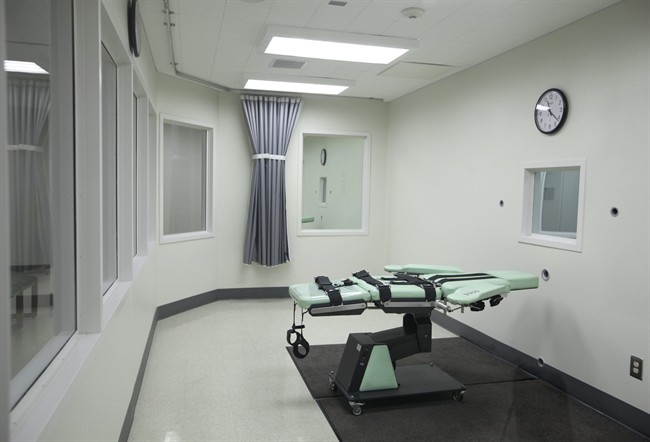Charles Rhines — a South Dakota man convicted of murder — could be executed because he is gay, after the U.S. Supreme Court rejected his appeal, say his lawyers and advocates.

On the evening of March 8, 1992, Rhines entered and held up the Dig ’Em Donuts shop on West Main Street in Rapid City, S.D., where he had recently been fired from. During the robbery, he was surprised by Donnivan Schaeffer, a 22-year-old store employee.
Rhines stabbed Schaeffer three times killing him. He was found guilty in 1993.
READ MORE: Man scheduled to be executed in Georgia had ‘racist, unfair’ trial
His lawyers argue that anti-gay bias among jurors led Rhines to be sentenced to death rather than life behind bars because a juror believed he would enjoy living in a men’s prison due to his sexual orientation.
“Jurors indicated that another deliberating juror had said that locking Mr. Rhines up with other men for life imprisonment without parole ‘would be sending him where he wants to go,’ read a court petition filed by Rhines’ lawyers Claudia Van Wyk, Neil Fulton and Stuart Lev.
During the sentencing phase, the jury often discussed the fact that Rhines was gay. One juror confirmed that “there was lots of discussion of homosexuality” and “there was a lot of disgust.”
“This is a farming community… There were lots of folks who were like, ‘Ew, I can’t believe that.’”, read court documents
Jurors also sent the judge a note asking if he would be housed in general population, if he might “brag” to “young men” about his crime, if he might have conjugal visits or get married, or if he would have a cellmate.
READ MORE: Mississippi eyes electrocution, firing squad as possible death penalty methods
On June 18, the U.S. Supreme Court declined to hear arguments in Rhines’ case without offering a reason, allowing the death sentence to stand.
Prosecutors have argued that statements gathered by defence lawyers following trial were “unreliably source” and that one juror who said Rhines might enjoy being locked up with other men was attempting a “stab at humour” but admitted it was “stupid.”
Global News reached out to Paul Swedlund, the assistant attorney general for South Dakota, for comment but did not immediately receive a response.
Advocates have argued that while juror statements during deliberations are normally untouchable, a 2017 Supreme Court ruling Peña-Rodriguez v. Colorado found that exceptions must be made in cases where racial bias affected the verdict.
“Blatant racial prejudice is antithetical to the functioning of the jury system and must be confronted in egregious cases,” the court ruled.
READ MORE: Alabama inmate heaved, coughed during lethal injection execution that took nearly 30 minutes
In a New York Times op-ed, Ría Tabacco Mar, a senior attorney with the American Civil Liberties Union, argued that the 2017 ruling should apply to in cases where there is bias against a persons’ sexual orientation.
“While bias in the criminal justice system is not always explicit, it was in Mr. Rhines’s case. That makes the court’s decision not to step in even more alarming,” Mar writes. “Sadly, the court will almost certainly be presented with more requests to review convictions or sentences poisoned by anti-LGBT bias. It should take the next opportunity to correct this mistake and recognize that prejudice against people who are LGBT should play no role in America’s criminal justice system.”
Rhines, 61, has been on death row for 25 years.




Comments